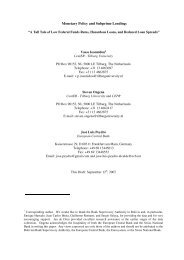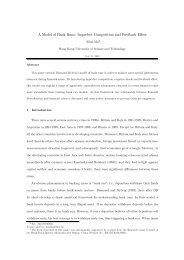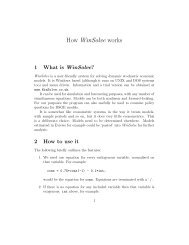Macroeconomics of the Franco-Prussian War Indemnity
Macroeconomics of the Franco-Prussian War Indemnity
Macroeconomics of the Franco-Prussian War Indemnity
Create successful ePaper yourself
Turn your PDF publications into a flip-book with our unique Google optimized e-Paper software.
Hong Kong Institute for Monetary Research<br />
share <strong>of</strong> consumption falls. Our preliminary conclusion is that <strong>the</strong> effects <strong>of</strong> productivity improvements<br />
may have <strong>of</strong>fset <strong>the</strong> effects <strong>of</strong> fiscal policy and <strong>the</strong> transfer. In sum, <strong>the</strong> early 1870s saw rapid output<br />
growth and an investment boom in Germany. Our research suggests that <strong>the</strong>se cannot be attributed to<br />
<strong>the</strong> transfer. Instead, <strong>the</strong>y may have been caused by improvements in total factor productivity. Candidate<br />
sources for this growth include liberalized rules <strong>of</strong> incorporation (in 1870), improvements in banking,<br />
efficiency gains from an expanded customs union, and railway unification.<br />
9. Conclusion<br />
The transfer problem is <strong>of</strong> interest for several reasons. It has played a large role in <strong>the</strong> development <strong>of</strong><br />
<strong>the</strong>oretical models in international economics. In economic history, a range <strong>of</strong> economic effects have<br />
been attributed to transfers, without much formal modelling. Transfers can be viewed as large-scale<br />
experiments with which to test models <strong>of</strong> <strong>the</strong> terms <strong>of</strong> trade. And models <strong>of</strong> transfers are needed to<br />
predict <strong>the</strong> effects <strong>of</strong> current transfers, such as development aid.<br />
Our work has shown how <strong>the</strong> predicted effects <strong>of</strong> a transfer depend on (a) international borrowing and<br />
lending, (b) supply-side responses, and (c) <strong>the</strong> degree <strong>of</strong> home bias in preferences. We also found that<br />
(d) evaluations <strong>of</strong> how much consumption smoothing was possible through international capital markets<br />
require that we carefully control for shocks o<strong>the</strong>r than <strong>the</strong> transfer. These four characteristics could also<br />
be taken into account in assessing contemporary transfers. For example, <strong>the</strong> response <strong>of</strong> a recipient’s<br />
terms <strong>of</strong> trade to a transfer made by a government or international organization or to <strong>the</strong> repatriation <strong>of</strong><br />
labour income may depend on <strong>the</strong> openness <strong>of</strong> private capital markets.<br />
Our results indicate that a dynamic, general equilibrium model <strong>of</strong> <strong>the</strong> current account and terms <strong>of</strong><br />
trade, which combines <strong>the</strong> transfer with historical changes in government spending and in productivity,<br />
does remarkably well in matching <strong>the</strong> key features <strong>of</strong> French macroeconomic history after <strong>the</strong> <strong>Franco</strong>-<br />
<strong>Prussian</strong> <strong>War</strong>. This is so even though (a) we have sought to match sample paths, ra<strong>the</strong>r than <strong>the</strong> weaker<br />
criterion <strong>of</strong> matching moments, and (b) we have studied <strong>the</strong> nineteenth century using parameter values<br />
from <strong>the</strong> twentieth century, ra<strong>the</strong>r than selecting parameter values to improve <strong>the</strong> fit <strong>of</strong> <strong>the</strong>se paths.<br />
Given <strong>the</strong> great size <strong>of</strong> <strong>the</strong> transfer, one might expect its effects to be glaringly obvious in <strong>the</strong><br />
macroeconomic data, to <strong>the</strong> point where one need not even try to measure o<strong>the</strong>r shocks. Popular<br />
history <strong>of</strong>ten made this assumption, and attributed large economic effects to <strong>the</strong> indemnity. On <strong>the</strong><br />
contrary, we find that changes in fiscal policy and in aggregate productivity are both needed in order to<br />
fit French and German macroeconomic history, especially with respect to <strong>the</strong> movements <strong>of</strong> output and<br />
consumption. This finding is striking evidence <strong>of</strong> <strong>the</strong> importance <strong>of</strong> international capital markets in <strong>the</strong><br />
late nineteenth century.<br />
21








